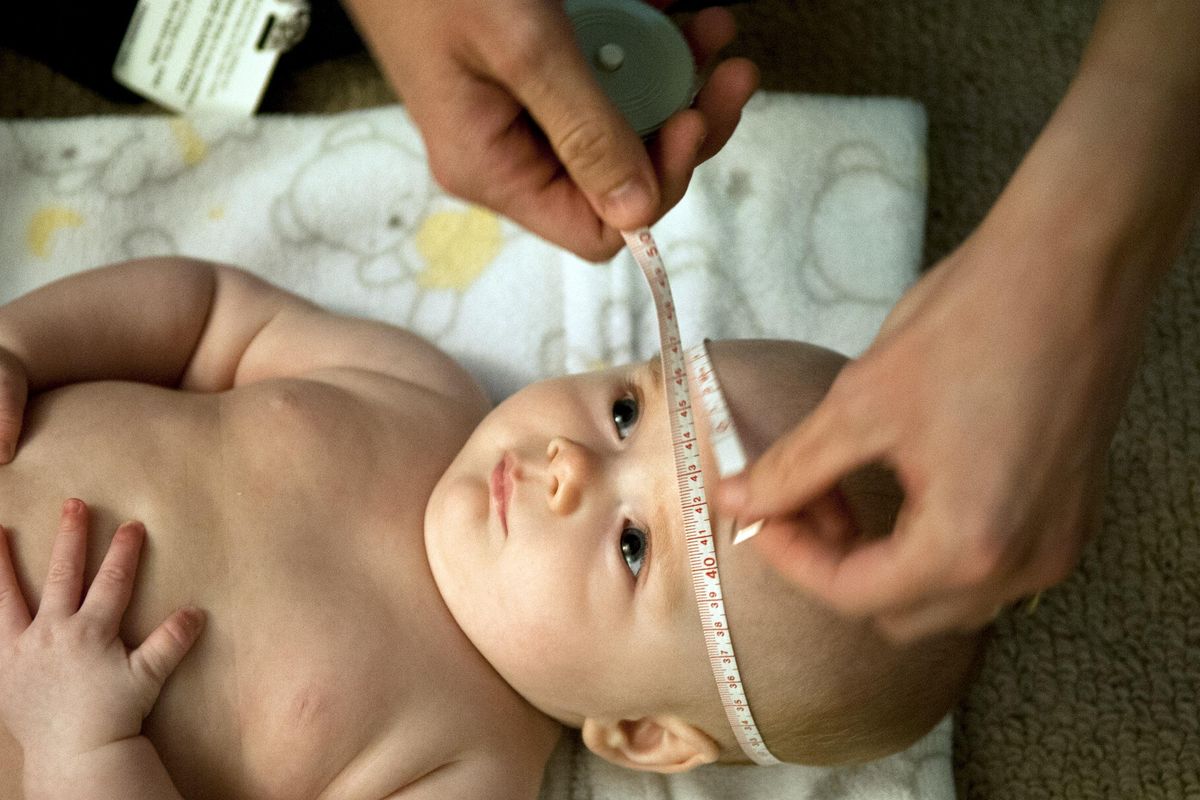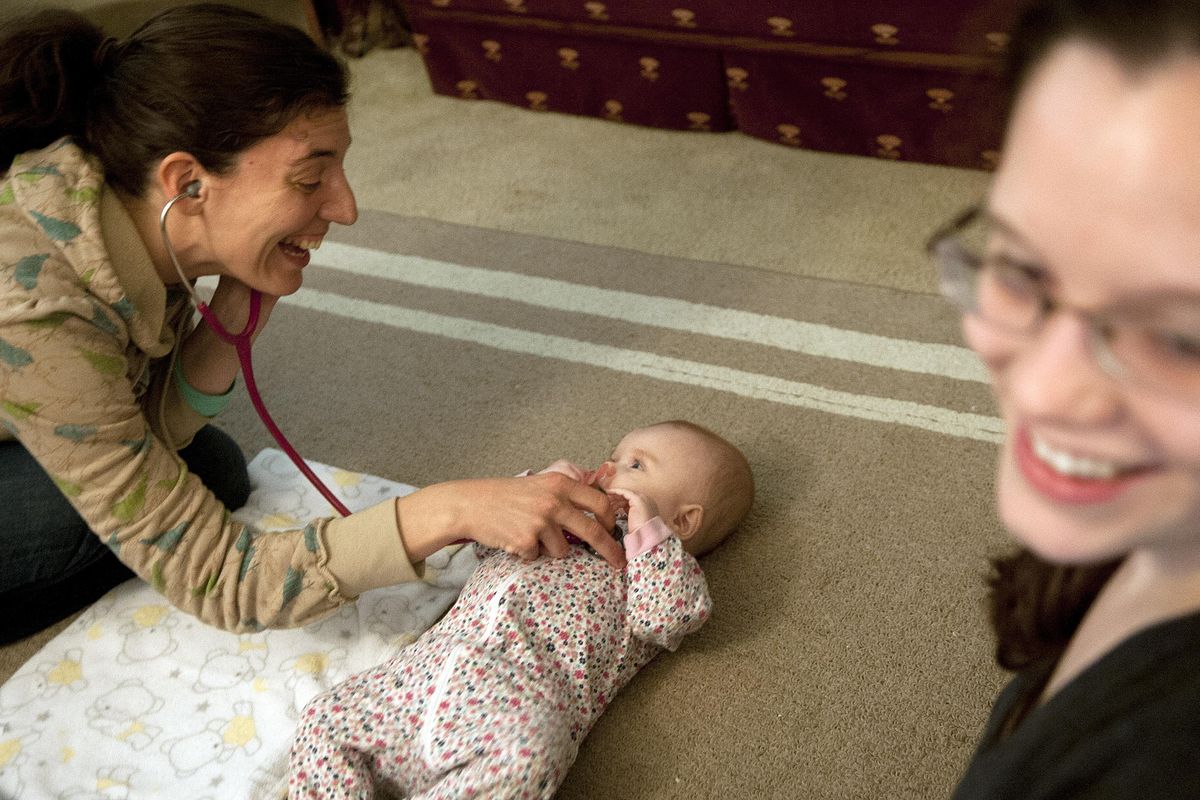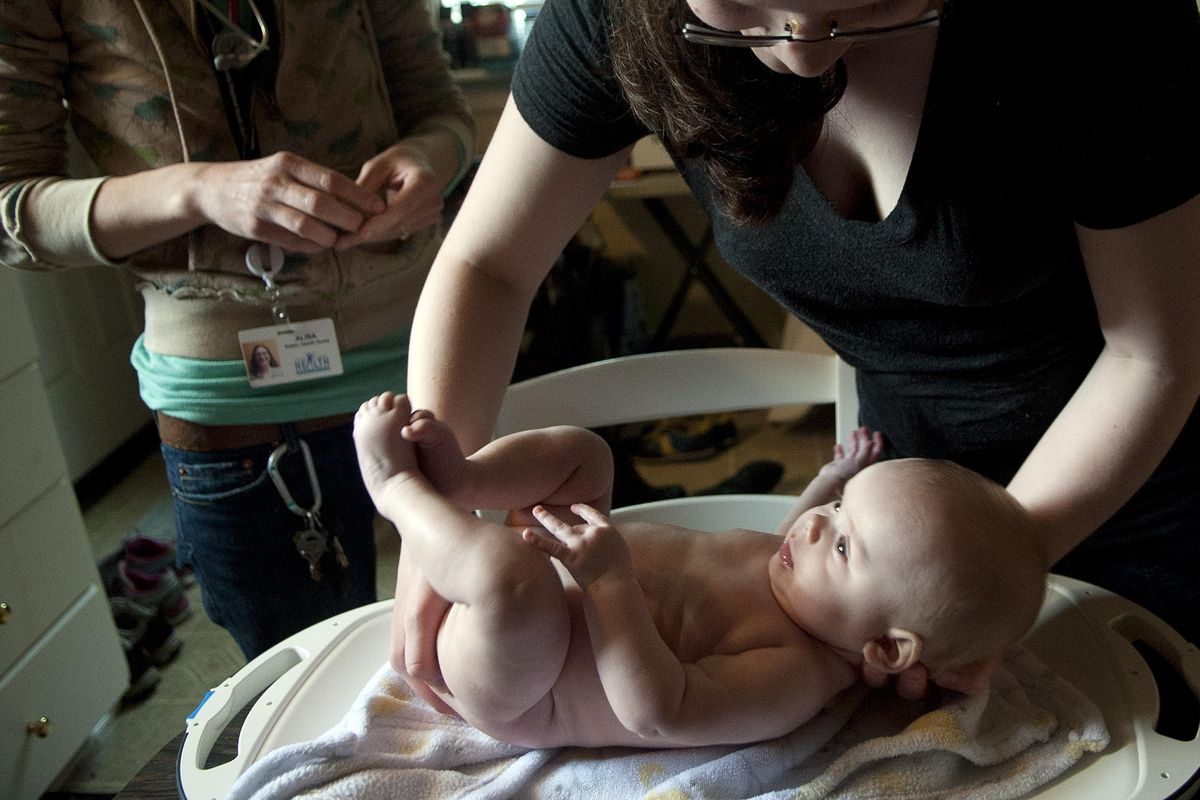After spate of high-profile Spokane child abuse cases, officials say help for stressed parents is available
Five-month-old Emma Ohnesorg is placed on a scale by her mother, Holly, in the kitchen of her home in Spokane as she waits to be weighed by Public Health nurse Alison Rasmussen, left on Thursday, April 6, 2017. The visit is part of the Nurse-Family Partnership. (Kathy Plonka / The Spokesman-Review)Buy a print of this photo
Lately, 5-month-old Emma Ohnesorg has been exploring her full vocal range.
One day, she’ll practice her pitch alternating between high and low screams and sounds. The next, it’s all about volume. And sometimes, she’ll start grunting and straining, making an odd noise that persists until her mother feeds her.
“It’s like she’s found some sort of new way to tell me she’s hungry,” said her mother, Holly Ohnesorg.
Ohnesorg recounted this progress to Alisa Rasmussen, a nurse with the Spokane Regional Health District who does home visits for first-time moms. During the visit Thursday, Rasmussen laughed, playing with Emma while telling Ohnesorg that it’s not unusual for kids to keep repeating odd noises if they’ve found them successful in getting food.
The program, called the nurse-family partnership, supports parents through pregnancy, birth and the child’s first two years of life by tracking growth, answering questions and educating parents about everything from breastfeeding to child development.
Ohnesorg found out about the program while pregnant. She doesn’t have family in Spokane and thought she could use the extra support with a new baby.
“Having somebody come by on a regular basis and tell me that my child is okay and the rash is normal … that sounds kind of handy,” she recalled thinking.
The nurse-family partnership is just one of the programs available to Spokane parents who may need extra support raising their children.
Following the highly publicized deaths of four children in the region from child abuse-related injuries in the past year, advocates and social service providers who work with children are working hard to get initiatives on abuse prevention up and running.
Many say that starts with programs like the partnership.
“We’re not doing enough. To have one death in the community is a big deal but to have four within such a short amount of time is really an eye-opener,” said Dena Chappell, a board member for the Spokane Prevention Of Child Abuse/Neglect Council.
The message advocates want to convey is simple: It’s okay for parents to ask for help or a break.
“If you feel like you’re reaching your limit, I think a lot of people aren’t aware that there’s help,” said Chris Rocholl, pediatric emergency doctor at Sacred Heart Medical Center and a board member for Partners with Families and Children.
SPO-CAN, as the council is known, also runs Our Kids, Our Business, an educational arm which encourages all Spokane residents to act against child abuse.
The group will hold a free reception April 19 for National Child Abuse Prevention Month, which will recognize the work of advocates and discuss how to do more to prevent abuse.
In spite of education and awareness efforts in the Inland Northwest, rates of child physical abuse haven’t declined much in years, said Keith Georgeson, a former pediatric surgeon who’s now the chief executive of Sacred Heart Children’s Hospital.
He said about 40 children per year are admitted to the hospital because of physical abuse. Children younger than 2 are most at risk for serious injuries and can suffer serious brain damage from shaking.
“The brain bounces around inside the skull and as it does that it tears vessels that nourish the oxygen to the brain,” Georgeson said. That causes trauma to brain tissue, as well as reduced oxygen supply from the broken vessels.
In younger children, it’s often fatal. Most children who survive a head injury from abuse will have lasting, lifelong damage, he said.
It’s tempting to think of abuse as a problem of bad or evil parents who maliciously set out to hurt their kids. But that’s not usually the case, said Rowena Pineda, a co-chair of Our Kids, Our Business for the past three years.
“I don’t think parents get up in the morning saying, ‘I’m going to hurt my children.’ I may be really optimistic about that, but I don’t think that parents say that to themselves,” she said. “So the question for me becomes, why does it happen? What are triggers? What’s the underlying reason?”
Many social workers point to stress. Being alone with a crying baby for hours at a time is hard, even in the best of circumstances. Add in the exhaustion of being a new parent, worried about paying for or finding child care or any one of the dozens of other challenges going on in a parent’s life, and it’s not hard to see how people can get short-tempered or desperate.
“Parenting is hard and I think society does not acknowledge that,” said Amy Knapton Vega, executive director of the Vanessa Behan Crisis Nursery. Parents feel social pressure to do everything themselves or tough it out, rather than asking for help or a break when they need it.
Some parents, particularly if they’re younger or inexperienced, may not have an idea of how children develop. They don’t always understand what children are capable of doing, how to get a kid to stop crying or how detrimental shaking a baby can be. Some grew up in abusive households themselves.
“Where do you learn to be a great parent if you didn’t have that yourselves?” Vega said.
Child care is a challenge too. In many of the recent child deaths in the region, children were left alone with stepfathers or boyfriends who may be less invested in the child’s well-being, or less knowledgeable about child care, than the biological parents.
“All four of those deaths have occurred because the child was placed in the care of someone who was not property equipped to care for that child,” Chappell said.
Parents often know better, but don’t feel they have other options.
“I’ve had mothers leaving kids with people that they didn’t feel safe with because they needed to go to that job interview or get groceries” said Rochella. He added, “Once the damage is done, it’s not something that a surgery or medicine is ever going to fix.”
How can we do better? Most social workers and advocates focus on education, letting parents know that resources are available to help before they get to a point of desperation. Those include free parenting classes through Vanessa Behan, which talk about stress management, appropriate discipline and child development, and programs like the nurse-family partnership.
Partners with Families and Children offers an array of services for parents and children, including a Fussy Baby Network line to call for help dealing with babies who cry a lot and have trouble sleeping.
Vega wants parents to feel more comfortable calling the crisis nursery, even if they don’t feel their situation is a true “crisis.” They care for about 5,000 kids per year for periods ranging from just a few hours to up to three days.
There’s no income requirement to use the nursery, and though they’re sometimes full, they can often provide support or refer to other services. Vega said she wants parents calling them anytime they’re less than 100 percent confident about the safety of their child care.
“You don’t perceive yourself as in crisis in that moment but the outcome was absolutely a crisis in every one of those cases,” she said.
Child protective services also plays a role. There’s a common perception that all they do is remove kids from their homes and place them in foster care, but that’s not the case, said Connie Lambert-Eckel, an administrator for the state agency that runs CPS.
For cases where children are being neglected, but there’s not serious abuse occurring, CPS can do a family assessment and ask parents to participate in a voluntary program designed to give them support so they can meet their children’s needs for food, medical care or anything else that’s being neglected.
The program, which is rolling out across the state and has been in place in Spokane County for several years, gives CPS a tool to get involved with families before something bad happens. It’s outside the court system, so parents don’t end up with a permanent record. Instead, they’re connected to things they might need, like food, caseworkers, mental health treatment and more.
If the situation worsens and abuse does occur, CPS can step in and investigate, but the goal is to avoid that.
In Spokane County, CPS received referrals for 7,242 children in 2016. Of those, 3,142 were referred to the family assistance program or investigated. Just 613 were removed from their parents’ care, in most cases temporarily.
“Our goal is to get ahead of it as much as possible,” Lambert-Eckel said. People can report suspected abuse or neglect to CPS through their statewide hotline, 866-END-HARM, or 866-363-4276.
People who don’t have children can help by looking out for the kids and parents in their communities, offering support like child care and letting someone know if they suspect abuse is occurring. Parents who are socially isolated are more likely to abuse their children, and it takes a community effort to stop that from happening.
“The more stress they have in their lives, the less social support they have, the more likely they are to not be able to cope with some of the challenges of raising their child,” said Sue Schultz, the program manager for the nurse-family partnership.
The nurse-family partnership serves 125 families like Emma’s and has spots for more, but Schultz estimates they’re only reaching about 10 percent of families who could benefit from their help.
“It really does take a community to be contemplative in what’s happening in kids lives around us,” she said.
This story has been updated to correct the name of the Our Kids, Our Business board member.

